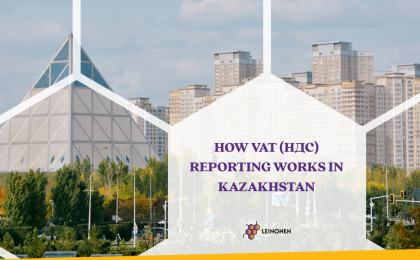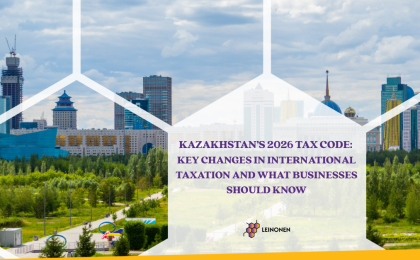Kazakhstan at a Glance
Kazakhstan ranked 25th in the World Bank´s Ease of Doing Business report in 2020. This is a comparatively great result, and doing business in Kazakhstan is generally not any more difficult or easier compared to other countries in the region.
Kazakhstan has a vibrant economy which is characterized by the rich oil and mineral industry and the resulting exports of these products. Kazakhstan is a major player in the global oil industry, ranking as the 12th largest oil producer. In 2023, the country produced about 1.8 million barrels of oil per day. This output is smaller compared to the United States (approximately 11.3 million barrels per day) and Saudi Arabia (around 10.8 million barrels per day), but larger than Norway (about 1.7 million barrels per day) and the United Kingdom (around 1.1 million barrels per day). Kazakhstan’s proven oil reserves stand at approximately 30 billion barrels, placing it 12th globally.
In addition to oil, Kazakhstan is rich in mineral resources. It is a leading producer of uranium, with over 40% of global production, and holds the second-largest uranium reserves worldwide. The country is also a significant producer of chromium, lead, zinc, manganese, and copper.
The oil and gas sector in Kazakhstan involves around 170 companies, including major international firms like Chevron, ExxonMobil, and Royal Dutch Shell, which collaborate with local entities such as KazMunayGas, the state-owned oil and gas company. Key oil fields include Tengiz and Kashagan, which are among the largest in the world. There is also a plethora of mostly foreign companies that are doing various consulting and services jobs connected to the oil and mineral sectors.
Being a landlocked country, there is also a large import sector and plenty of logistics businesses that operate in the country. Additionally, the country strives to diversify its economy by growing the financial, IT, and tourism sectors.
Company Establishment
Foreign and local investors may use a variety of legal entities to conduct business in Kazakhstan. The most commonly used ones are Joint Stock Companies, Limited Liability Partnerships, Representative Offices and Branch Offices.
Joint Stock Companies or JSCs issue shares to attract investments and capital to finance their activity. They may have one or more shareholders, and the shareholders are not liable for the JSC´s liabilities. The minimum capital for a JSC is approximately EUR 300,000 and it may have one or more shareholders.
The LLP or Limited Liability Partnership is the most common form of legal entity chosen by small and medium sized businesses. LLPs differ from JSCs in the way that they do not issue shares, but instead the participants hold interests in the partnership. The charter capital for a LLP may be set at zero with some exceptions. In most cases if a foreign company would like to set up a subsidiary in the form of an LLP, they will find that the parent company may not act as the sole holder of interest in the LLP. Currently, the law requires that there be at least one other participant, which can be a legal entity or a physical person. If a physical person establishes an LLP in Kazakhstan, they may act as the sole participant. The participants are generally not liable for the LLP´s liabilities outside of their capital contribution, but there are some exceptions.
Foreign companies can also establish representative offices (RO) and branch offices (BO) in Kazakhstan. These entities are considered a part of the parent entity. The main difference between them is that a RO can only perform representative activities on behalf of the parent entity, such as marketing and advertising. A BO can perform all or part of the activities of the parent entity, including entering into commercial agreements and activity. Branch offices face an additional Branch Profit Tax of 15 % from their profits, so if the founders expect to make profit, then usually it makes more sense to establish an LLP.
If you want to establish a company in Kazakhstan, Leinonen’s skilled staff can make the process as smooth as possible.
Accounting & Taxation
Accounting and payroll in Kazakhstan
Managing accounting and payroll according to local laws is mandatory for any organization working under Kazakh law. Accounting and payroll in theory is not so different between various countries, but in practice there is always an ocean of details to consider. To make sure your organization is compliant, it is necessary to use an accountant who has plenty of experience in the Kazakhstani market.
As in other CIS countries, the fiscal year in Kazakhstan is the same as the calendar year. Also similarly, the 1C accounting and ERP program dominates almost all of the market. Finding accountants with skills to use other programs can be difficult. Multinational organizations who wish to work within their own ERPs may find themselves having to do double accounting in the local and in their own software.
What are the controlling institutions?
The Ministry of Finance of the Republic of Kazakhstan is the controlling body for accounting legislation. Companies´ tax payments are controlled by the State Revenue Committee which works as part of the Ministry of Finance. The Ministry of Labor and Social Protection of the Population controls issues connected to labor law, labor protection and payroll.
Here are the most common tax rates in Kazakhstan:
- Corporate Income Tax – 20 %
- Value Added Tax – 12 %
- Property Tax – 1,5 %
- Personal Income Tax – 10 %
- Social Tax – 9,5 %
- Social Security Contribution – 3,5 %
- Compulsory contribution to Social Medical Insurance Fund – 3 %
These are the basic rates that companies should consider. There are several exceptions, caps to tax rates and other taxes that are not mentioned here. Some exceptions to VAT include:
- Export of goods and international transportation services are subject to 0 % VAT.
- Sale of some goods and services such as medicines, financial services, notary services, operations with financial securities and investment gold are exempt from VAT.
Kazakhstan uses an e-invoice system for issuing VAT invoices which is mandatory for VAT payers. Depending on the type of goods sold, the seller may need to use a Virtual Warehouse module to register their goods, without which using the e-invoice system and consequently without which the sale of the goods is not possible. The legislation concerning VAT is stipulated by the Kazakhstani Finance Ministry and the Tax Code.
Kazakhstan additionally has a wide range of various Withholding Taxes that are applied for cross-border transactions. Special attention should be paid to documenting cross-border transactions to avoid unnecessary withholding taxes. A good example is the import and sale of software and software licenses. If the Kazakhstani subsidiary of an international software company would like to sell software licenses that it purchases from its parent entity, the purchase transaction is subject to a Withholding Tax called Royalty Tax. This tax is generally 15 % depending on the home tax jurisdiction of the Ultimate Beneficiary Owner of the software license. The Kazakhstani authorities employ a list of countries that they consider Tax Havens, and based on this list the Withholding Taxes may vary. The tax legislation concerning sale of software and licenses has changed in 2023-2024, which is why we recommend to pay special attention to this topic in your business.
Additionally, companies in Kazakhstan may operate in one of several Special Economic Zones or SEZs that will affect their tax rates. For example, companies operating in the Astana Hub SEZ for IT companies enjoy an exemption from Corporate Income Tax, plus other deductions in payroll taxes.
If you are looking for a reliable partner in Kazakhstan to do your taxes, get in touch with Leinonen.
Some tips for business in Kazakhstan
As in other countries in the CIS region, the local legislation in Kazakhstan is usually subject to rapid changes. These changes can affect companies´ accounting and payroll as well as the legal environment they operate in during short notice. This means that it´s very important to make sure the right professionals are supporting you with accounting and legal matters. Using accounting outsourcing in Kazakhstan is a good choice precisely for the reason that accounting companies have the resources to constantly monitor and stay ahead of changes in the local legislation.
The tax rates for businesses in Kazakhstan especially in payroll, are quite low in comparison to international standards. Additionally companies can lower these rates further via tax planning or working in one of the Special Economic Zones. It’s important to note though, that although the tax rates may be low, the penalties for non-compliance or non-payment are very high. For this reason we recommend that businesses pay special attention to taxes payable in Kazakhstan.
Employment
Employment matters in Kazakhstan are regulated by the local Labor Code. The code states that labour relations are regulated via employment agreements, which must be concluded in written form and conform to the local minimum requirements.
Companies working in Kazakhstan generally have a freedom to employ without using employment agencies. In some dismissal cases, the local Employment Center has to be notified. Employment Centers are local subdivisions of the Ministry of Labor and Social Protection of the Population. Employers have to follow requirements such as providing a working place which complies with regulations as well as providing their employees workplace accident insurance.
Employment agreement may be concluded as fixed-term for a term of no less than one year, or non-fixed term. Fixed term employment agreements are considered as changed to non-fixed term agreements after they are extended two times. Probation periods are generally used, and they may not exceed three months apart from some management positions.
Employers are not free to dismiss employees without basis. Employment relations can be terminated in three ways:
- Mutual agreement of the parties;
- Termination by the employee´s initiative;
- Termination by the employer´s initiative.
In case of termination by the employer´s initiative, the labour code sets out a number of possible reasons for this. All of them are quite serious, such as working in an intoxicated state or revealing employer trade secrets. The labour code and courts are protective of employees in Kazakhstan, so employers need to be careful when managing their labour relations.
Outsource your payroll management in Kazakhstan to Leinonen to ensure, that everything runs smoothly.
Being an Expat
An investor looking to start a company in Kazakhstan may want to consider moving there to manage their company. In this case they must first start their company so that they have the company’s registration certificate, and after that apply for a work permit.
Kazakhstan is a nice place to live, with a rich history and beautiful nature, and the living costs are quite low. Finding an apartment may be tough if requirements are complex. We recommend using a real-estate agent when looking for an apartment, as most of the advertisements online are outdated.
Foreign nationals who spend more than 183 days in a calendar year in Kazakhstan are obliged to pay taxes and contributions to the local social security system. Usually double taxation can be avoided but this should always be checked on a case-to-case basis.





